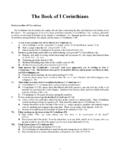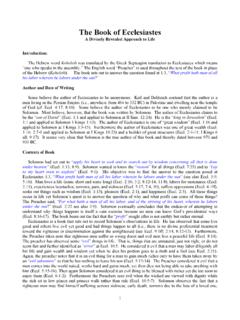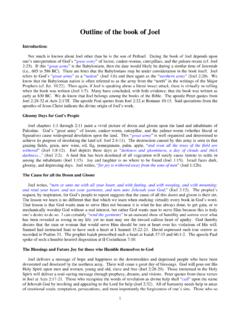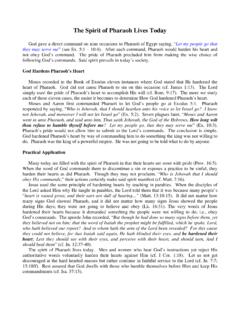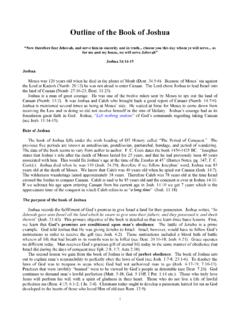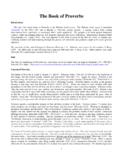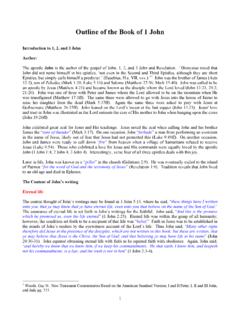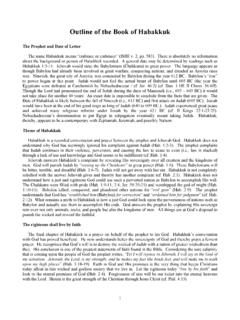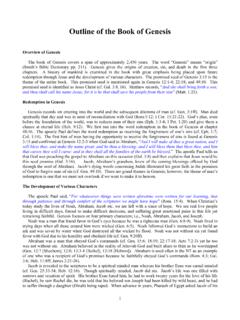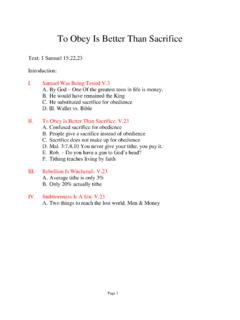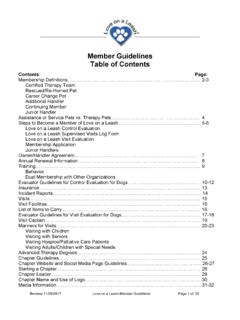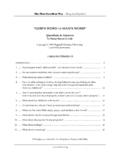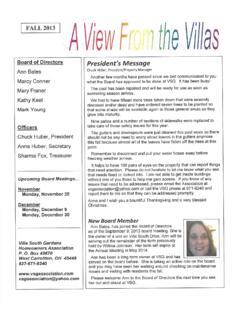Transcription of Outline of Romans - Floral Heights Church of Christ
1 1 Outline of the Book of Romans Introduction: During the year 57 BC the apostle Paul was in the city of Corinth. A great need had arisen in Jerusalem due to many saints living in poverty (Acts 24:17, Romans 15:25-28, I Cor. 16:1-9 and II Cor. 8-9). Paul s intentions were to take collected funds from the Gentile churches in Macedonia and Achaia back to Jerusalem and then visit the Romans on his way to Spain (cf. Rom. 15:26-28). While waiting the time of his departure from Corinth to Jerusalem, Paul penned this epistle to the Romans . The objective of the epistle appears to be fivefold. First, Paul revealed the purpose of preaching and teaching to be that of producing obedience (cf. Rom. 1:5; 16:26). Secondly, Paul explained the power of gospel message (Rom. 1:16) that tells of the saving blood of Jesus Christ (Rom.)
2 3:24-25; 5:8-9). Thirdly, Paul answered the age-old question regarding how one becomes a Christian throughout chapters 1-10. Fourthly, the Christian s responsibilities in all aspects of life are revealed at Romans 12-15. Finally, Paul painted a clear picture of the kingdom of God in chapter 16. The kingdom of God, the Lord s Church , is comprised of faithful individuals. Faithful Christians of NT days paid careful attention to who was true to God s word. Those who taught different doctrines caused harm to the body of Christ and were, therefore, to be marked (Rom. 16:17). Wrath awaits the man or woman who rejects Christ s blood sacrifice (Rom. 2:2ff). Paul therefore preached the gospel message that individuals may obey God and be saved from His wrath (Rom. 1:5). Obedience is certainly a key factor in one s stand with God. Paul stated, Know ye not, that to whom ye present yourselves as servants unto obedience, his servants ye are whom ye obey; whether of sin unto death, or of obedience unto righteousness?
3 (Rom. 6:16). One s obedience leads to righteousness which is connected to being made free from sin (Rom. 6:18). When I am free from sin, I am justified (Rom. 4:5; 5:1), a recipient of God s grace (Rom. 5:2; Eph. 1:7), righteous, sanctified, and have a true hope of eternal life (Rom. 6:19-23). Paul examined the faithful life of Abraham to illustrate to his audience that justification comes through faithful obedience and always has. What is it that I need to obey? Paul instructed the Romans to hear and believe the gospel message (Rom. 10:17), repent of past sins (Rom. 2:4), confess with the mouth that Jesus is Lord (Rom. 10:9), be baptized for the remission of sins (Rom. 6:1-11), and live faithfully (Rom. 2:7-9; 6:16). Faithful living takes into consideration God s laws (Rom. 12:1-2). The Christian is commanded to exercise tender loving affection toward all (Rom.)
4 12:9ff), leave vengeance to God (Rom. 12:17ff), be subject to and respect the existing civil governing authorities (Rom. 13:1-7), leave worldly thinking behind (Rom. 13:11-14), be considerate of others opinions in matters that will not effect the eternity of the soul (Rom. 14 all), promote unity in the body of Christ (Rom. 15:5-6), and meditate on God s laws (Rom. 15:14ff). There are people all over the world now, as there were in Paul s day, that are currently doing all they can to press into heaven through fear and obedience to the Lord. Romans 16 illustrates that such faithful people kept up with each other and welcomed each other with open arms when traveling to these various locations. Christians today ought to keep up with each other. Knowledge of the faithful and unfaithful will keep the Church pure and members from being swayed away from truth by the smooth and fair speech of false teachers (Rom.
5 16:17-18). Author of the epistle to the Romans : Romans 1:1 reads, Paul, a servant of Jesus Christ , called to be an apostle, separated unto the gospel of Clearly the apostle Paul wrote the roman epistle. Tertius (Rom. 16:22) was evidently one who wrote as Paul dictated the epistle. Paul did however, write some of his own epistles (cf. I Cor. 16:21; Gal. 6:11; II Thess. 3:17 and Phm. 1:19). Place of Writing: There are four reasons to accept the city of Corinth as the place of Paul writing the epistle to the Romans : 1. In chapter 16:1, Paul commends Phoebe to the brethren in Rome. He reveals the fact that she is from Cenchreae. Evidently Phoebe is attending others who hand delivers this epistle to the brethren in Rome. Her hometown gives us her origin. Cenchreae is a town located only seven miles from Corinth.
6 2 2. Gaius showed hospitality to Paul ( Romans 16:23). Gaius was baptized by the apostle Paul at Corinth (I Cor. 1:14). Thus Corinth was Gaius residence. 3. Erastus is mentioned as the treasurer of the city where Paul was writing from (Rom. 16:23). Erastus is known to have his residence at Corinth as well (II Tim. 4:20). 4. Compare Acts 24:17, Romans 15:25-28, I Cor. 16:1-9 and II Cor. 8-9. This contribution is the same in all three books. Time of Writing: Romans 15:22-29 gives us the details as to when Paul wrote this epistle. He had intended to visit the roman brethren on his way to Spain. Before his visit; however, he had to attend to business at hand. He determined to deliver the relief collected from the Gentile churches in Macedonia and Achaia to the needy saints in Jerusalem. Time line: AD 51, Nero Claudius Caesar Agustus Germanicus (Nero) banished the Jews from Rome (Acts 18:1-2).
7 Aquila and Priscilla, a couple from Rome, traveled to Corinth because of the decree of Claudius (Acts 18:2). The Apostle Paul travels to Corinth from Athens and there meets Aquila and Priscilla (Acts 18:1ff). AD 51-53, Paul stays in Corinth for 18 months teaching and preaching the word of God (Acts 18:11). At this time, it is most likely that he penned the epistle to the Galatians and both epistles to the Thessalonians. According to II Thessalonians 1:1, Silas and Timothy remained with Paul during his stay at Corinth. From Corinth, Paul travels to Ephesus with Priscilla and Aquila. We are not told whether Silas and Timothy made this trip with Paul. Paul leaves Priscilla and Aquila in Ephesus and travels to Caesarea of Judea then up to Antioch (Acts 18:18ff). AD 55, apparently, Paul s visit was short. He tells the brethren of his success in Macedonia, and then travels back through southern Galatia to Ephesus on his third tour of preaching.
8 Evidently Timothy was now in Ephesus with Paul (Acts 19:22). Whether he came there originally with Paul, Priscilla and Aquila, we are not told. We do know that Paul pined the epistle to the Corinthian brethren from Ephesus (I Cor. 16:8-9), and that Paul sent Timothy and Erastus to Corinth from Ephesus (Acts 19:22) that they may put you (Corinthians) in remembrance of my ways which are in Christ , even as I teach everywhere in every Church (I Cor. 4:17). AD 55-57, Paul remains in Ephesus preaching and teaching for two years and three months (Acts 19:8-22). Acts 20:31 refers to his stay as three years. AD 57-58, Paul travels to Macedonia and Greece (Acts 20:1ff). He collects the funds from the Gentile brethren. After three months in Greece (Acts 20:3), he traveled back to Jerusalem with the funds expecting to be there before Pentecost (Acts 20:16).
9 Evidently then, while Paul was on his third tour of preaching in Corinth, preparing to travel to Jerusalem with the collected funds, he pins the epistle to Romans . The year is AD 57-58. This coincides with Romans 15:22-29. The Purpose of the epistle: Paul had heard of the faith of the roman brethren as well as the rest of the world ( Romans 1:8). For years he had desired to see them face to face ( Romans 1:11, 15:23). Often times he desired to travel to Rome yet he was hindered ( Romans 15:22). It is his desire that Rome be his resting place as he journeys on to Spain ( Romans 15:24, 28). Due to the heretics who abounded, it was obviously Paul s intent to set matters of justification and salvation straight in the minds of the roman brethren. This is in keeping with his desire to have all men obey the gospel, which had power unto salvation.
10 Many of the Jews considered the fact that since they were descendants of 3 Abraham they had the hope of salvation. Paul exposes the error in this line of thinking and helps them to see that they will be justified from their sins by an obedient faith in Jesus Christ alone (Rom. 5:1ff). Once justified from their sins, they must exist as living sacrifices that they may please the Lord (Rom. 12:1ff). Outline of Romans Chapter 1 I. The Apostle Paul s relation to Jesus (1:1-5): A. Paul, a servant of Jesus Christ , called to be an apostle, separated unto the gospel of God, which he promised afore through his prophets in the holy scriptures, concerning his Son, who was born of the seed of David according to the flesh, who was declared to be the Son of God with power, according to the spirit of holiness, by the resurrection from the dead; even Jesus Christ our Lord, (1:1-4).
